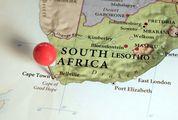RELIGION is beautiful. Religion can be kind. Religion, in the hands of progressive, questioning leaders, can be a force for emancipatory politics, a source of comfort, guidance and hope.
Religion also has a long and shameful history of being used as an instrument to justify white supremacy, sexism and homophobia, as well as a means to control and oppress. The pulpit is a powerful place.
When Rivers Church pastor Andre Olivier stood on his pulpit to spew his vitriolic racist diatribe, he was joining a long line of those bent on abusing faith to uphold white supremacy.
In a blatant inversion of facts, he noted: "Don’t say the problem in SA is the white people. No, we are not. We have contributed to this nation, and we still do. If you want to know why white people still have money, it is because they work. So don’t drive them away. They can speak into your life."
This is, of course, a blatant denial of reality. In a country where white people were complicit in and continue to benefit from 400 years of colonialism and apartheid and their legacies, where white people have economic and spatial privilege, access to capital and opportunities, his arcane views reflect a willful lack of interrogation of his own complicity, no doubt aided by his belief in his exclusion from blame through the performance of acts of charity, and a deliberate attempt to repress using the vehicle of religion.
In many religious communities globally, religion has been used by powerful men as a tool to exclude, to marginalise and to justify violent politics of racism and exclusion cloaked in the legitimacy of religion.
I attended a Jewish primary school in Johannesburg. Every Friday, one awkward 13-year-old boy would be called onto the stage at assembly to sing his Bar Mitzvah portion, a particularly unpleasant experience for boys at the shuddering, voice-cracking precipice of puberty.
Croakiness notwithstanding, it was evocative. At the end of the portion, the boy in question would be handed a certificate that included an acknowledgement of a donation to the Jewish National Fund, which would entitle him to a tree, planted in his name in Jerusalem. It was presented as a powerful and symbolic moment, a coming of age enveloped in green.
As many writers and activists have observed, the Jewish National Fund was instrumental in the planting of plant forests on the sites of villages destroyed in the process of the ethnic cleansing of Palestine in 1947 and 1948. It continues to function as a greenwashing of repressive policies and occupation in Israel. It is a tool of displacement, of erasure, yet, sadly, the planting of trees in its name is inveigled as a central feature of a critical moment in Jewish tradition.
The toxic conflation of Judaism and Zionism is a willful instrumentalisation. Judaism is a religion, and like all religions is textured by powerful insights and calls to humanity. Zionism, on the other hand, is a racist politics premised on white supremacy and settler colonial occupation, which finds its actualisation in the ethnic cleansing of Palestine in 1948.
In conflating the two, Jewish leaders create a willful politics of co-optation, sinisterly attempting to deflect criticism of a racist politics as a function of anti-Semitism, in the process attempting to lend a religious and thus not-open-to-question zeal to a political project, while simultaneously detracting from efforts to counter actual anti-Semitic rhetoric.
Across all religions there are wonderful leaders encouraging questions, deriving lessons and humanity from the texts and principles of their faiths. It is significant and it is powerful. At the same time, the power of religious leaders to misappropriate, to present as sacrosanct and imbue with unfounded legitimacy the most perverse of bigotry, is terrifying.
• Bluen is the project leader for international justice at the Institute for Justice and Reconciliation. She writes in her personal capacity




















